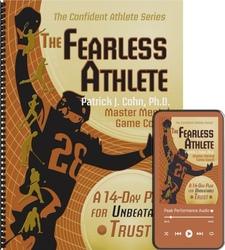
How to Leave a Legacy
Are You a Fully Committed Athlete?
Why is being “all in” important during your athletic career?
If you want to accomplish all you can in your sport, achieve your long-term goals, and maximize your athletic potential, there is only one way…
BEING ALL IN!
This does not mean obsessing over your sport or limiting your identity to only being an athlete.
Being “all in” means fully committing to maximizing the opportunities in front of you.
Being all in is:
- Showing up to practice with a plan.
- Focusing fully on performing drills, mechanics, and team play during training.
- Giving 100 percent effort during practice until the session ends
- Preparing for competitions to the best of your ability.
- Taking care of yourself mentally and physically.
- Being fully engaged in competitions, whether on the field or the bench.
- Setting realistic, challenging goals.
- Adding mental toughness training to your training regimen.
- Developing your confidence, focus, and poise through mental training.
- Learning from your losses and your victories.
- Being resilient in the face of adversity.
Does being “all in” mean you will win every game or tournament? No.
Does being “all in” mean you will always be on top of your game? No.
However, not being fully committed guarantees under performance, frustration, and less enjoyment of your sport.
Is there a chance you won’t reach your dream? Yes.
Is it possible you may fall short of your long-term objective? Yes.
However, when you have given it all you have, mentally and physically, there will be no regrets at the end of your athletic career. You won’t be haunted by “what could have been?”
You will know, without a doubt, that you achieved all you could in your sport, and you will look back at your career with fondness and pride. That, in and of itself, is worth the commitment and effort.
Italian gymnast Vanessa Ferrari, with her unwavering dedication, has set the goal of making her fifth Olympic team to close out her career.
At 33 years old, Ferrari is fully committed to her goals and maximizing her potential. When Ferrari retires, she wants no regrets or thoughts of “what could have been.”
This “all-in” mentality is the legacy she wants to leave behind and the message she wants to send to her younger teammates.
FERRARI: “For me, it’s incredibly important to be able to convey my passion for gymnastics and to make [young gymnasts] understand the importance of finding inner strength, of always overcoming obstacles and moving forward.”
“Whether for better or for worse, hard work pays off. You can’t always have everything you want, but being content knowing you’ve done everything you can, I believe, is very important and eventually brings satisfaction.”
Are you willing to commit to your athletic career and leave behind a legacy that you can be proud of?
How Will You Be ALL IN?
Are you participating for the wrong motivation? Are you looking for rewards, accolades, prestige, or to make others happy.
We even think that proving others wrong–when they said you can’t make it–is not the best motivator.
Start with the perspective of being 100 percent self-motivated–passionate about your sport and you would do it no matter the accolades that come with winning.
Think about the legacy you want to leave behind. Write a statement about how you want to remember your athletic career.
Take full responsibility for your career and don’t leave it up to chance or waiting for that “big break.”
Related Sports Psychology Articles
- A Mindset for Success
- How to Create a Roadmap for Mental Toughness
- How to Reach for Your Athletic Potential

The Focused Athlete (Digital Download)
“The Focused Athlete” audio and workbook program helps you or your athletes overcome distractions and sharpen your concentration during competition. You learn how to get locked in during practice and competition so you can improve and perform better.
“First, I would like to thank you for the help given to me through your programs, ‘The Confident Athlete’ and ‘The Focused Athlete.’ I have made tremendous sacrifices though all these years to become a top Olympic Trap shooter but something was missing. This missing part was with my mental game. My scores increased tremendously in record time and others said that I was a different shooter.“
~Marios Kapodistria

